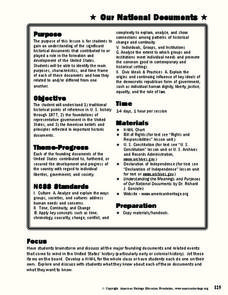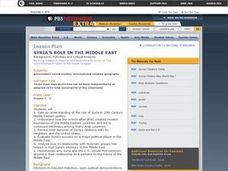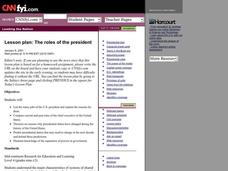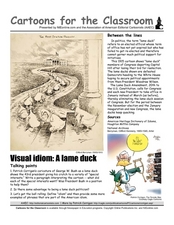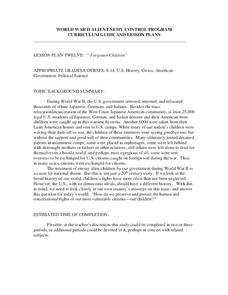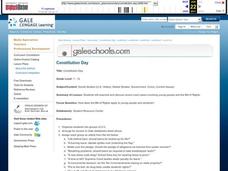University of Arkansas
Our Responsibilities
The fourth in a five-instructional activity unit examining human rights and personal responsibility asks class groups to investigate a current rights issue, and using the provided graphic organizer, summarize the issue, consider which...
Curated OER
A Dictionary of Independence
Young scholars use events and biographies from their state's history and U.S. history, to create a dictionary of terms for citizens of a democracy.
Curated OER
Bill of Rights
US history classes explore constitutional rights as they relate to court cases involving teens. Your class must already be familiar with the Bill of Rights before beginning this series of exercises. In preparation for a debate-style...
National Endowment for the Humanities
Lesson 2: The Debate in Congress on the Sedition Act
Pupils research and discuss the provisions in the Constitution that supported the arguments for and against the Sedition Act. They articulate objections to and arguments in favor of the Sedition Act.
Curated OER
Arkansas Black Pioneers: A History of African-American Colonies in Arkansas
Students identify various regions of early Arkansas as these regions relate to African American colonies that settled in Arkansas after the Civil War.
Curated OER
Our National Documents
Students consider the significance of selected American documents. In this civics lesson plan, students analyze excerpts of the Declaration of Independence, the U.S. Constitution, and the Bill of Rights.
Curated OER
Reconstruction (1865–1877)
In this online interactive history worksheet, students respond to 7 short answer and essay questions about the causes and effects of Reconstruction following the American Civil War.
University of Arkansas
Assessment and Discussion
"Without concerned citizen action to uphold them (human rights) close to home; we shall look in vain for progress in the larger world. . ." Eleanor Roosevelt's comment is used to set the stage for the conclusion of a five-activity unit...
Curated OER
State Symbols
Third graders examine the symbolism of the United States by observing different flags. In this U.S. History lesson plan, 3rd graders utilize the Internet to research state seals, flags, and other symbols that represent specific...
Curated OER
Campaign Posters 1788-1816
Seventh graders examine the first years of the U.S. under the U.S. Constitution. They identify the main themes of the Federalist and Republican parties, conduct research, and write a campaign speech and create a campaign poster.
Curated OER
War Making: Executive and Legislative Powers
Students examine executive and legislative powers. In this federal powers lesson, students determine who has the power to wage war in the U.S. government. Students analyze the Constitution and research historical precedents regarding...
Curated OER
Civil Liberties and National Security
Young scholars identify the civil liberties outlined in the U.S. Bill of Rights and discuss the importance of these liberties in today's society. They research examples of when Congress has taken legislative action to protect national...
Curated OER
Fugitive from Labor Cases: Henry Garnett (1850) and Moses Honner (1860)
Students engage in the comparison of cases which demonstrate the increasingly volatile political crisis in the 1850s arising over the issue of slavery and the necessity for the enactment of the 13th, 14th, and 15th Amendments to the U.S....
Curated OER
Syria's Role in the Middle East
Students hypothesize why Syria and the U.S. should find common ground in their relationship as it pertains to the future of the Middle East.
Curated OER
The Roles of the President
High schoolers list the many jobs of the U.S. president and explain the reasons for them. They compare current and past roles of the chief executive of the United States.
Curated OER
Who are American Citizens?
Students investigate American citizenship. In this civics lesson, students consider the basic knowledge of U. S. government new citizens are required to have. Students also examine the 14th amendment that describes U. S. citizenship.
Curated OER
Cartoons for The Classroom: Lame Duck Congress
Clear up "lame duck" congressional confusion with this political cartoon analysis worksheet. Background information on the concept's history and current use is provided, and 2 cartoons give a past and present context. Three talking...
Curated OER
Internet Fact Hunt at the "Fact Monster" Web Site- Hunt #33
In this Internet fact hunt worksheet, students access the "Fact Monster" web site to locate the answers to 5 multiple choice questions. They answer questions about US history, geography, literature, and science.
C-SPAN
Electoral College Pros/Cons and Alternatives
If every vote counts, why do we need the electoral college? Middle and high schoolers study the Constitutional precedent of the electoral college, as well as its place in historical and modern elections, with an engaging social studies...
Curated OER
World War II Alien Enemy Control Program
Students become familiar with the concepts of human rights and constitutional rights. They have an increased awareness of the historical record as to the cessation of these rights, especially in regards to children during WWII. It is...
Curated OER
"Martial Law in Hawaii After the Attack on Pearl Harbor"
Students explore the concepts of martial law, writ of habeas corpus, due process, discovery and human and constitutional rights during World War II. They assess the roles and responsibilities of government leaders and citizens during...
Curated OER
Do Suspected Enemies Have Rights?
Students investigate the history of Japanese immigration. They complete an online Webquest, explore various websites, answer discussion questions, and locate and read newspaper articles about enemy compatants.
Curated OER
Constitution Day
Students examine and discuss recent court cases involving young people and the Bill of Rights.They use a focus question to create the context for class discussion: How does the Bill of Rights apply to young people and students?
Curated OER
People From American History
For this social studies worksheet, 4th graders will gain an understanding of nine famous Americans and their accomplishments to society. Students will complete nine fill in the blank statements about each individual.







